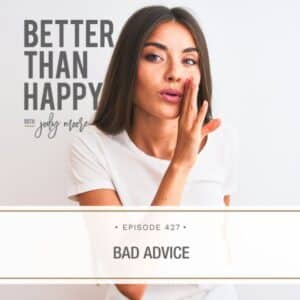Podcast: Play in new window | Download

Sometimes, we hear things that sound good and righteous on the surface, but when you dig into them a little, they actually have the potential to cause problems. For example, you may have heard people say, “Divorce is not an option…”. Of course, nobody gets married with the intention of getting divorced, but is taking it off the table as an option really helping anyone? This is just one of countless examples out there of bad advice.
I’m discussing five pieces of what I think is bad advice that we tend to talk about and pass around as if they’re good advice. There may be a good application of these pieces of advice in very specific situations, but on the whole, thinking of them as general good advice is doing more harm than good.
Tune in this week to discover five pieces of advice that might not be the good advice you think they are. I’m sharing the story behind each piece of bad advice, and showing you how to start determining whether or not a piece of advice is as good as it first appears.
If you want to take what you’re learning on the podcast and take it to the next level, implementing these lessons in your life, you need to join Better Than Happy: The Lab! Be Bold will also be part of The Lab, and it will encompass all the best bits of Be Bold while creating an environment that better serves the audience of this podcast. Stay tuned for more details.
What You’ll Learn on this Episode:
- 5 examples of pieces of advice that aren’t actually helpful.
- How following prescriptive advice stops you from creating what you really want.
- Why bad advice generally leaves us struggling and overwhelmed.
- The ways we often use bad advice against ourselves.
- How to start looking more deeply at pieces of advice you’ve never questioned before.
Mentioned on the Show:
- Coaching changed my life and I’ve watched it change the lives of thousands of men and women since. But is it right for you? You’ll only know by giving it a try. Try it out today by clicking here.
- Come check out Be Bold
- If you’re a coach who is already certified through The Life Coach School, I want to help you take your coaching to the next level. Interested? Get on the waitlist here.
- Get on the waitlist for Business Minded here.
- Follow me on Instagram or Facebook!
- Grab the Podcast Roadmap!
- Better Than Happy: Connecting with Divinity through Conscious Thinking by Jody Moore
- Follow my brand new business Instagram account where I’ll be sharing my business tips for all you entrepreneurs!
- Check out this episode on my YouTube channel
I’m Jody Moore and this is Better Than Happy, episode 427, Bad Advice.
This is Better Than Happy, the podcast where we study what the healthiest, most successful people in today’s world think, feel and do. And we leverage this knowledge to create our best lives. Are you ready, little bird? Let’s fly.
Hello everybody, welcome to Better Than Happy. I have five different pieces of what I think mostly are bad advice that we tend to talk about and pass around as though they are really good advice. And I’m not saying that they maybe can’t be good advice for certain people in certain situations, but I think to think of them as overall, general good advice, may be doing more harm than good.
And my guess is as I talk about the five that came to my mind, you’re going to have others that come to your mind and I would love to hear those. Please head on over to Instagram. We will have a post up looking for bad advice. The only reason we’re doing this, not to focus on the negative but we just want to bring to our attention, hey, this thing that I thought sounded so good and useful and righteous actually might be causing problems. And then you can decide if you want to keep it or not.
I do want to also make a quick announcement before we dive into the five pieces of bad advice I came up with today, which is we are launching a program that is meant to take the podcast to the next level for you. And it is going to be called Better Than Happy: The Lab. And my team and I have been working on this program for a long time. We’re actually going to be folding our previous coaching program, Be Bold into this. We are sort of making a pivot from Be Bold into The Lab.
We want The Lab to be all the great things that Be Bold has been in the past but we want to bring in a little bit of diversity in terms of topics that we address. We want to create an environment that better serves all of you, the audience of this podcast. In the past, Be Bold has been designed primarily for women and yet we know that we have tons of men who are benefiting tremendously from this content. So we want to have topics and things that will be more relevant and applicable to men.
We hear all of you say, “My young adult kids or my older teens, they really like this.” Guess what, young adults and older teens come on into The Lab. We’re going to take all the concepts of Better Than Happy and put them to work in our lives in The Lab. So I will have more details soon. I just wanted to make an announcement that it’s coming and get you excited about it.
Stay tuned. Make sure you’re subscribed to the podcast and that you’re paying attention to our social media and all of that and we will get word out as soon as it is ready to go, which is going to be in the next couple of weeks here so that’s going to be fun.
Okay, so let me begin and just dive right into the advice that we pass around that I think is bad advice. The first one and the one that really prompted me to want to do this podcast episode is when we say divorce is not an option. We sometimes talk about this to engaged couples, we say, “Just remember, there’s going to be hard times, but if you just keep in mind, divorce is not an option then you will work through anything.” I do not think this is good advice.
I do not think, first of all, that it’s true. It’s a lie. Divorce is an option. Why are we lying saying divorce is not an option? Divorce is an option. Here’s why I think it’s problematic. It might force you to stay in your marriage, but is that really what we want or do we want you to learn how to create a healthy, strong marriage? I’m not saying you should turn around and quit on your marriage. I’m saying, know that divorce is an option and then you empower yourself to maximize your agency.
I think a lot about what we believe in the LDS faith tradition about the premortal life, when the savior had his plan or wanted to go along with Heavenly Father’s plan and He would play his role in that. And Satan said, “No, we should take away everyone’s agency.” The Lord’s plan was everyone will have agency and they will get to choose for themselves and in the choosing they will sometimes choose wrong and they will sometimes choose right. And all of that will be for our betterment in the end. It will help us become more like our heavenly parents.
So, Satan said, “No. Why do we want people to be able to choose the wrong? People should only be able to choose the right.” He wanted to take away our agency. Divorce is not an option, sort of falls in the camp of let’s not tell people they even have a choice. Let’s pretend they don’t have a choice. Let’s convince them to convince themselves that they don’t have a choice. You do have a choice. When you feel stuck and trapped, you lose the ability to choose.
The choosing is an important part of creating what you ultimately will want in your marriage. If you’re not able to choose it, you cannot evolve your relationship to the level that’s possible and that you would want. Do you see what I’m saying? So when you acknowledge, divorce is an option and sometimes when I’m coaching someone who’s struggling in their marriage, they haven’t wanted to visit the option of divorce in their mind at all. And a lot of times their loved ones around them with best of intentions, don’t want them to visit that either because we’re afraid they’ll just take that door, take that escape.
And as a coach, what I do is I say, “Let’s visit it.” I’m not saying, let’s execute it in the real world necessarily. I’m saying let’s visit it in your mind. It is an option. It might even be the right option or it might be the ‘wrong choice’ and it’s still okay. When we put all this pressure, heaviness, feeling of being trapped and stuck on ourselves, we can never evolve our marriage to the level of true connection, true intimacy, true conflict resolution. Those things are not available from you have to do this, there’s no other option.
So sometimes just revisiting in your mind, divorce is an option. I could get a divorce and it would be okay and it would be hard, just like staying is hard and we visit both. And we don’t put so much pressure and heaviness or absolute right and wrong on one or the other. We can get to a more confident decision. Divorce actually is an option, just saying.
So this next one is a similar version of that, but there’s the story that gets told. And I hear this and motivational speakers love to tell this story, and I didn’t take the time to Google the story, you can go Google if you want. But it’s essentially about a man leading an army and they get to some island. They sail on these boats to the island and then they need to take over the island. And the leader of this army burns the boats. He commands them to burn the boats, which means they have no way off the island. Their only option is to win this battle or die trying.
So then people tell this story and then they’ll relate it to your business or something, they’re like, “Burn the boats because then you have no choice but to succeed.” I don’t think this is usually good advice. I think burning the boats means you’re now driven by fear and can you succeed out of fear? Yeah, you can. It might help you win the battle, but at what cost, at what level of trauma? And this whole story in itself is based on war and killing.
I’m just like, “Why is this story inspiring to so many people?” I do not find it inspiring. I want to know what they were fighting over anyway, and who rightfully owned that land or whatever. There’s just so many things I don’t like about this story. I get it, you don’t want to just quit at the first chance of things getting hard. You don’t want to jump on the boat and sail away in this metaphor. But I don’t think burning the boats is necessary. I don’t think you have to quit your job right away to be successful at your business.
I think you can keep a job and grow your business and then you don’t have to worry that the boats are burned and be operating out of fear and stress and trauma. I think you can do things the safe way and still make tremendous progress. You can go all in, in something and have a boat there just in case. I’m just not a fan of burning the boats.
Here’s another piece of advice. We tend to say this with the kids about grades but I think then we apply it to a lot of situations. “I don’t care about your grades, honey. It’s okay if you don’t get straight A’s as long as what?” You know what comes next. “As long as you tried your best.” Now, again, that might be good advice for some kids or some people at some times.
But in general, I hear people take this to an extreme. I see people take it to an extreme in their lives and they’re trying to do their best at everything and I’m like, “Why? That job doesn’t need to be done at your best. You could do that job at what is half of your best and it’s still going to get it done.” What are the things that need to be done at your best that you want to put your best into? Okay, put your best into whatever you want, but not everything. That’s exhausting.
If you think that the right measure is whether or not you did your best, oh my goodness, no wonder you’re so tired and stressed out. Guess what? I don’t do my best at so many things, I don’t. Some things I try my best at, but actually very, very few, very infrequently do I think I’m going to try my best. Usually I’m just like, “I’m going to give this whatever I’ve got for today and it’ll be good enough.” Good enough. Good enough and done is more my motto.
And it helps me get so many more things done and it helps me have a more balanced life and it helps me show up for all the places and things I want to do without feeling stressed and overwhelmed because I don’t have to judge myself that it wasn’t my best. Of course it wasn’t my best. In fact, some days, some weeks, the whole thing is not my best and I don’t go, “You didn’t even try your best. You got a B and you didn’t even try your best.” No, I got a B because that’s all that this job really needs is a B. So as long as you do your best, just be careful about that advice.
Would I tell my kids, actually, I don’t even tell them that I expect them to try their best. I just say, “Well, it looks like you tried and it seems like you didn’t really care about that subject. What’s going on there?” I like to have conversations. I want to know what’s going on. I want to know their why. They might have a good reason why. I think they might have a valid reason why, because I was really tired today, mom, that was all I was capable of or you know what, I wasn’t thinking about that. I was worried about what’s going on with my friend.
That’s valid, friendships are important, relationships are important, just as important as grades, if not more. Being the person you want to be matters more to me than your grades. And sometimes being the person you want to be means that you’re not going to be able to give your best to everything. I get it. Have more interesting conversations than just simply slapping on something like do your best. Do your best is just I don’t think very good advice. There, I said it. Tell me why I’m wrong.
Okay, next one is again sort of similar to this but I hear this one, people use this against themselves all the time, this advice when it comes to your eating habits, your exercise, your parenting, and that is, consistency matters the most. As long as you’re consistent, you’ve got to be consistent. What I think people hear when we say be consistent is they hear just be perfect at doing it every time.
As long as you’re doing it every time then we’re good. I’m sorry, that’s not a thing, that’s just not possible. So consistency, I mean, again, it depends on how you interpret that word. I do think that there’s a benefit to consistency, but I just know myself, I tend to be, what in my mind anyway, feels like inconsistent and you know what? I’m still able to get a lot done. I’m still able to make progress in a lot of ways. I still love myself.
I still say, “Good job, Jody Moore, you did it again another day. Well done.” Even though sometimes I’m inconsistent. Aim for consistency, but inconsistency is okay too. Just be careful about using advice like this to judge yourself. That’s what I’m saying.
And here’s the last one. This I hear again about parenting, I hear couples say, “Well, I know however we want to parent our kids is fine as long as my husband and I are on the same page.” Where did this advice come from? You guys just need to be on the same page. mom and dad or business partners, as long as we’re on the same page then we’re good.
Now, again, I’m not saying there’s never a time when this could be a useful way to think about it, but mostly I see people use this to freak themselves out. They’re like, “Oh, no, my husband parents this way and I parent this way and we need to get on the same page.” And what I always say is, “Well, that’s easy, why don’t you just get on his page? Why don’t you just decide that the way you want a parent is wrong. His way is right for you and your family and do that, and then you guys are on the same page. That’s what you are telling me, matters the most.”
And I can’t think of one time anyone said, “Okay, yeah, I’ll do that.” They say, “No, because I feel like he’s”, for example, they may say, “I feel like he’s too harsh. He really comes down hard on them or gets upset with them when they don’t do their chores or when they’re loud or whatever.”
And I say, “Okay, so instead of getting on the same page, maybe you want to bring what you bring to the parenting and your husband brings what he brings because we can’t change him or control him. We can have conversations with him and tell him what we think. But if that’s not working, then maybe you want to bring something else. Maybe after your husband’s hard on them, you at some point want to bring some softness and some tenderness. So maybe, you balancing that out is more important than you guys being on the same page.”
And I’m not talking about disrespecting one another. And I’m not talking about throwing one another under the bus or talking about your spouse behind their back, in front of their kids. None of that is necessary, you guys. And you still don’t have to be on the same page. You can know that he has his way or she has her way and you have yours and now what? Who do I want to be now? What do I want to bring to this situation?
How do I bring love and compassion to my child and to my spouse who has their own ideas about how to parent? So just be careful about telling yourself, well, I know the most important thing is that we’re on the same page and we’re just not on the same page. Maybe that’s not the most important thing. Maybe that would be great, that would be ideal, but it doesn’t always happen and you can still have an amazing family life and do a great job with those kids, even if you’re on pretty different pages about certain things.
Alright, again, I would love for you to come to Instagram and tell me what did I miss? What’s some other advice that we get handed that we all kind of throw out there and nod our heads as though yeah, I’ve heard that before, that’s good advice, that maybe actually not be serving us in many cases. I’d love to hear it, come on over to Jody Moore Coaching at Instagram and share in the comments or send me a DM and let’s take this conversation further, alright. Thanks for joining me today. I will see you next time on another episode. Bye bye.
Coaching changed my life and I’ve watched it change the lives of thousands of men and women since, but is it right for you? You’ll only know by giving it a try. Try it out today at jodymoore.com/trial.
Enjoy the Show?
- Don’t miss an episode, follow on Spotify, Apple Podcasts, Google Podcasts, or RSS.
- Leave us a review in Apple Podcasts.






